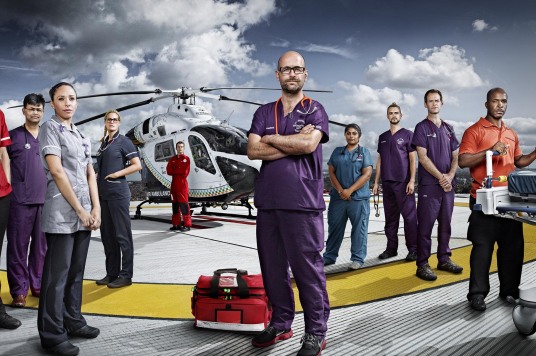New series of ’24 hours in A&E’ featuring St George’s
Channel 4’s award-winning series, 24 hours in A&E spent six series and seventy episodes at King’s College Hospital in south London, but now the new series will feature St George’s Hospital in south west London, whose A&E department is one of the most advanced and busiest in the world.
Episode 1 will air on Thursday 30 October at 9pm on Channel 4.
In the first episode of the new series, St George’s trauma team fight to save the life of a young woman after a horrific motorbike accident.
29-year-old dental nurse Kerry arrives from Essex by emergency air ambulance on the hospital’s new helipad as a ‘code red’ patient. She was riding her motorbike when she lost control and crashed, completely severing her right leg below the knee.
Kerry’s grandparents, Dennis and Angie, received a phone call about the accident and were among the first people on the scene. “We got there and saw Kerry laying in the ditch,” says Dennis. “I see these two fellas running up and down the road. They didn’t know who I was and I said ‘Excuse me, what are you looking for?’ and he said ‘We’re looking for the young girl’s leg’.”
Due to the severity of her injuries, specialists from seven different departments have been called in to treat Kerry. Trauma consultant Jai is in charge. “When you say ‘code red’, you get a patient who’s lost a lot of blood and they are critically unwell,” he says. “If you cut off your lower limb, the worst thing that can happen is that they can lose the whole volume of blood and as a result your heart goes into cardiac arrest.”
But the medics need to stabilise Kerry before they can send her for a CT scan to see if it’s possible to re-attach her leg. “Time is very critical when we are considering re-attachment of the leg,” says consultant Jai. “But the first priority is always life. Limb comes second after life.”
Kerry’s grandparents have always been worried sick about her getting a motorbike. “We literally begged her not to, but Kerry desperately wanted a motorbike, so she went out and got one,” says Dennis. “Our heart was in our mouth every time she went out on that bike until I heard that motorbike come back here.”
Meanwhile 11-year-old Luke is brought into the department after suffering a prolonged epileptic seizure. Luke has a form of complex epilepsy that has left him with severe learning difficulties. He has up to three seizures a week.
While the paediatric team stabilises Luke, his mum and dad discuss their love for him and the challenges of living with Luke’s condition.
“Do I resent my son’s illness? No, absolutely not. Do I become jealous of parents who have ‘normal’ children? Without a doubt,” says Luke’s dad, Jack. “You’re different from other people, that’s the way it’s going to be, it’ll probably be that way for the rest of your life…it’s not even clear if he’s going to outlast me or I’m going to outlast him.”
But there are pluses too. “We went through such a horrific time when he was little, but you come out the other end and you realise ‘OK, this is different than what I was expecting, but actually not awful, it’s actually very valuable and very positive’,” says Luke’s mum, Catherine. “He’s such a delight, he’s so positive, he’s so much fun, he’s got a healthy stubbornness about himself – we’d like to wrap him in cotton wool and he refuses to let us do that.”
And 19-year-old Tina comes to A&E after stepping on a sewing needle which is stuck inside her foot. But she seems more keen on taking advice from her mum in Lithuania than from Mo, the doctor treating her.


